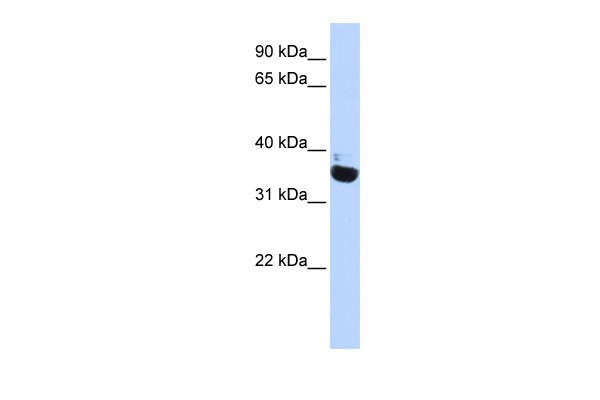OR13C5 antibody - N-terminal region
| Product name: | OR13C5 antibody - N-terminal region |
| Source: | Rabbit |
| Purity: | >95% |
| Buffer Formulation: | phosphate buffered saline , pH 7.4, 150mM NaCl, 0.02% sodium azide and 50% glycerol. |
| Applications: | Dog, Human, Mouse, Rat |
| Storage: | Aliquot and store at -20°C. Avoid repeated freeze / thaw cycles |
| UOM: | 100ug |
Rabbit anti-OR13C5 polyclonal antibody - N-terminal region
Catalog Number:IC105647
Product Profile
| ProductName | Rabbit anti-OR13C5 polyclonal antibody - N-terminal region |
|---|---|
| AntibodyType | Primary Antibodies |
| Immunogen |
The immunogen for anti-OR13C5 antibody: synthetic peptide directed towards the N terminal of human OR13C5 |
Key Feature
| Clonality | Polyclonal |
|---|---|
| Isotype | IgG |
| Host Species | Rabbit |
| Tested Applications | |
| Species Reactivity | |
| Concentration | 1mg/ml |
| Purification | Affinity purified |
Target Information
| Gene Symbol | OR13C5 |
|---|---|
| Gene Synonyms |
OR9-11
|
| Gene Full Name | Olfactory receptor, family 13, subfamily C, member 5 |
| Gene Summary |
OR1C35 is part of the olfactory receptors that interact with odorant molecules in the nose, to initiate a neuronal response that triggers the perception of a smell. The olfactory receptor proteins are members of a large family of G-protein-coupled receptors (GPCR) arising from single coding-exon genes. Olfactory receptors share a 7-transmembrane domain structure with many neurotransmitter and hormone receptors and are responsible for the recognition and G protein-mediated transduction of odorant signals. The olfactory receptor gene family is the largest in the genome. The nomenclature assigned to the olfactory receptor genes and proteins for this organism is independent of other organisms.Olfactory receptors interact with odorant molecules in the nose, to initiate a neuronal response that triggers the perception of a smell. The olfactory receptor proteins are members of a large family of G-protein-coupled receptors (GPCR) arising from single coding-exon genes. Olfactory receptors share a 7-transmembrane domain structure with many neurotransmitter and hormone receptors and are responsible for the recognition and G protein-mediated transduction of odorant signals. The olfactory receptor gene family is the largest in the genome. The nomenclature assigned to the olfactory receptor genes and proteins for this organism is independent of other organisms.
More
|
| Alternative Names |
OR9-11
|
| MolecularWeight(MW) | 36kDa |
| Sequence | 318 amino acids |
Database Links
| Entrez Gene | 138799 |
|---|---|
| SwissProt ID | Q8NGT0 |
| Protein Accession | NP_001004482 |
Application
-

Western blot
0.2-1 ug/ml
ELISA Titer: 1:312500
Positive Control: Human heart
Additional Information
| Form | Liquid |
|---|---|
| Storage Instructions | Aliquot and store at -20°C. Avoid repeated freeze / thaw cycles |
| Storage Buffer | phosphate buffered saline , pH 7.4, 150mM NaCl, 0.02% sodium azide and 50% glycerol. |
Note: The product is for research use only,not for use in diagnostic or therapeutic procedures.













